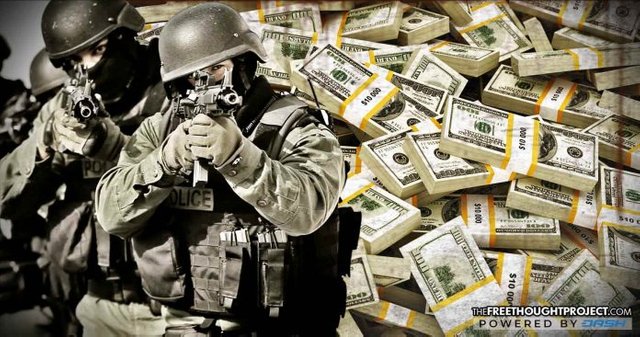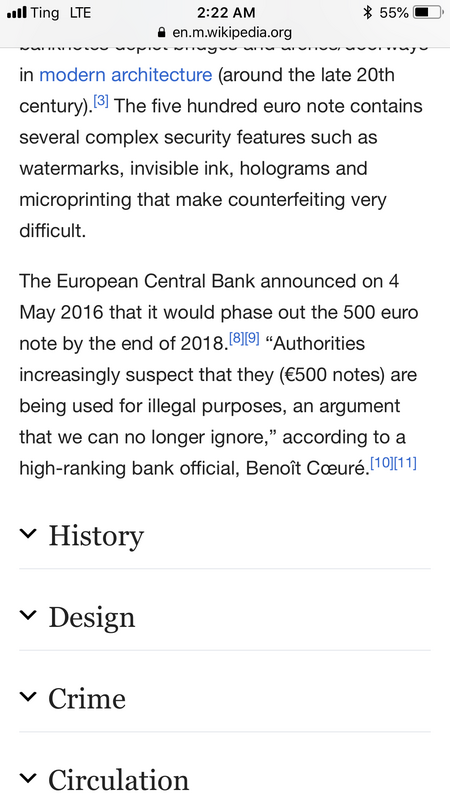By Jay Syrmopoulos

Canberra, Australia – The Australian government announced that it will soon be illegal to use more than $10,000 cash to purchase anything, forcing individuals that wish to buy more expensive items to use a cashier’s check or electronic transfer, ostensibly in the name of fighting organized crime and money laundering. The move reportedly comes in response to the government’s Black Economy Standing Taskforce. In addition to the cash purchase ban, the government has allocated a $319 million package to the Tax Office to develop new strategies to target the black economy.
Treasurer Scott Morrison said the Black Economy Standing Taskforce will include a rigorous identification system and “mobile strike teams,” in an effort to detect people making suspicious cash transactions, as well as a black economy hotline for citizens to report anyone suspected of engaging in illegal transactions.
“Cash provides an easy, anonymous and largely untraceable mechanism for conducting black economy activity,” the response said. “Cash payments make it easier to under-report income and avoid tax obligations. This allows businesses transacting in cash to undercut competitors and gain a competitive advantage.”
It said the task force had identified examples of “large undocumented cash payments being made for houses, cars, yachts, agricultural crops and commodities”, which contribute to the $50 billion black economy and “hurt honest businesses.”
Revenue Minister Kelly O’Dwyer said the ban on cash purchases of more than $10,000 would begin on July 1 of next year. “This cash payment limit will capture high-value transactions and help stamp out opportunities for criminals to launder the proceeds of crime into goods and services, or for businesses to hide transactions to reduce their tax liabilities,” she said. This of course is not a phenomenon unique to Australia, as there is an ongoing international “war on cash.”
In the United States, Larry Summers, a former U.S. Treasury Secretary and Harvard president, pushed and effort during the Obama administration to abolish $50 and $100 bills. There has also been talk within the EU of doing away with the €500 note.
India has already made such moves. While the publicly stated reason for these policies is to fight criminals, terrorists, money launderers, drug dealer, etc., by making it more difficult for them to move cash, the actual reason for the international “war on cash” is to give government more control and power.
A report in The Atlantic explains that while some believe that a cashless system would be “simple and elegant,” there are ominous implications about further centralization of power that must be considered:
Federal, state, and local law enforcement, as well as tax authorities, want to bring as much of the economy under their direct supervision as possible. … Forget folks who like cash. Never mind worries about forcing us all to run all spending through a corrupt corporate-banking system. Never mind the resilience of having a medium of exchange in the non-digital world that works when the power grid is down, when one’s smart phone is dropped in water, when one’s identity is stolen by hackers, or one’s account frozen by Visa or Bank of America because a purchase on vacation was deemed suspicious.
Friedersdorf goes on to clarify how the elimination of cash could dramatically erode financial privacy; pointing to Supreme Court case U.S. v. Miller:
There is no legitimate “expectation of privacy” in the contents of the original checks and deposit slips, since the checks are not confidential communications, but negotiable instruments to be used in commercial transactions, and all the documents obtained contain only information voluntarily conveyed to the banks and exposed to their employees in the ordinary course of business.
In a report for Forbes magazie, founder Steve Forbes elaborates on this line of thinking:
The real reason for this war on cash–start with the big bills and then work your way down–is an ugly power grab by Big Government. People will have less privacy: Electronic commerce makes it easier for Big Brother to see what we’re doing, thereby making it simpler to bar activities it doesn’t like, such as purchasing salt, sugar, big bottles of soda and Big Macs.
The movement against cash is clearly about centralized control of the economy, as international bureaucrats believe they can control the global economy better than the free market. Forbes goes on to explain:
The move to destroy cash feeds into the economic commissars’ fantasy that they can better control the economy. Policymakers in Washington, Tokyo and the EU think the reason that their economies are stagnant is that ornery people aren’t spending and investing the way they should. How to make these benighted, recalcitrant beings do what they’re supposed to do? The latest nostrum from our overlords is negative interest rates. If people have to pay fees to store their money, as they do to put their stuff in storage facilities, then, by golly, they might be more inclined to spend it. To inhibit cash hoarding—when Japan announced it was imposing negative interest rates, the sale of safes soared—the authorities will want to do away with large notes.
Of course, one of the primary purposes of the Australian government’s movement against black markets and large cash purchases comes down to lost revenue for the state. In fact, the government reported that the package against black markets could potentially net the state billions of dollars more in revenue. So, while governments like to use fear mongering about terrorism and drugs as a means of eliciting support for policies restricting the use of cash, the real motive behind these laws is clearly to give government more power. The ability to track every transaction provides an invaluable asset to a global spying apparatus (Five Eyes) that aims to sweep up all available information with no regard for the existence of individual privacy.

We are the Free Thought Project — a hub for Free Thinking conversations about the promotion of liberty and the daunting task of government accountability. All of our content was created by our team of artists and writers. Learn more about us on our website thefreethoughtproject.com.
Well at least they strengthen the use case for cryptos. We all know prohibition does not work when it comes to drugs, why do they think cash will be any different?
Downvoting a post can decrease pending rewards and make it less visible. Common reasons:
Submit
This war on cash is going to boomerang big time! It drives more and more people into crypto and will make crypto cash like this even more popular.
Downvoting a post can decrease pending rewards and make it less visible. Common reasons:
Submit
The war on cash will continue, until we have a cashless society. They will then outlaw non government backed crypto's and then the interest rates will really go negative. With A.i pushing the boundaries with facial recognition and predictive profiling, we better be careful what we say or even think in the near future....
Downvoting a post can decrease pending rewards and make it less visible. Common reasons:
Submit
That is a (dystopian!) possibility, but my money is on Crypto, at least in democracies where the people will vote out governments that restrict their freedom. China is already well down the path you outline. But in South Korea the people are already pushing back against Crypto regulation.
Downvoting a post can decrease pending rewards and make it less visible. Common reasons:
Submit
The €500 Euro note is still in circulation, but not for long...

Should America ever need to buoy the value of the US dollar, it could start re-issuing $500 bills;
what else are narco-terrorism groups going to use for transporting large amounts of currency?
Apparently the €500 Euro note is currently the note of choice thanks to its value.
Hey America!
Want to raise the value of the dollar?
Issue hundreds of billions worth of $500 bills - You can bet they'll be bought up around the world in no time as a false store of value (think Weimar Republic type hyper-inflation, eventually).
We can stretch this party out a little further, until contending with the financial reckoning that's 2 generations overdue...
Downvoting a post can decrease pending rewards and make it less visible. Common reasons:
Submit
This is the lie.
Taxes do not go to the govern-cement. They go to the banks. Where it is thrown into a furnace. From thin air, back to thin air.
Taxes are just a way of terrorizing people.
Downvoting a post can decrease pending rewards and make it less visible. Common reasons:
Submit
All I have to say is decentralize everything!!! Peaceful Anarchy all the way!! Cryptos, minerals, gems, and resources is all we need!
Downvoting a post can decrease pending rewards and make it less visible. Common reasons:
Submit
Yes, they're going at it worldwide. In Italy is now illegal to pay directly in cash employees and there was already a limit for how much you can purchase in cash.
But it's all good, of course, it's against exploitation, black economy, terrorism, and those parasites that don't want to pay taxes! Yayy!!
Downvoting a post can decrease pending rewards and make it less visible. Common reasons:
Submit
Curated for #informationwar (by @openparadigm)

Relevance: War on Cash
Our Purpose
Downvoting a post can decrease pending rewards and make it less visible. Common reasons:
Submit
Anybody remembers that cash, and specially the one came from drug dealers and crime syndicates, actually saved us from the 2008 economic crisis? i don't think that cash is going to disappear anytime soon..
https://www.theguardian.com/global/2009/dec/13/drug-money-banks-saved-un-cfief-claims
Downvoting a post can decrease pending rewards and make it less visible. Common reasons:
Submit
Well said rogueintel, and furthermore, scott morrison can kiss my arse! That guy is a pure evil propaganda machine.
Downvoting a post can decrease pending rewards and make it less visible. Common reasons:
Submit
lol!
Downvoting a post can decrease pending rewards and make it less visible. Common reasons:
Submit